Dental Treatments > Dental Implants
What is dental implant?
A dental implant is made of titanium that has been placed into the jawbone to replace your missing tooth root. Titanium root provides a replacement tooth or bridge in place.
Replace Missing Teeth with Dental Implants
There are several treatment options to replace missing teeth – dentures, dental bridges and dental implants. Dental implants is an ideal and long-term replacement solution for lost teeth:
- Feels and acts like natural teeth amongst teeth replacement solutions. Dental implants provide for a solid attaachment into and with your jaw bone. With a crown over the implant posts, it is visually like a natural tooth and you can smile, chew and speak without hesitation.
- Implants can potentatially prevent bone loss. If a lost tooth is not replaced, the living tissue has no continuous stimulation and starts to resorb. As dental implants is fused to the your jaw bone, this “exercises” bone preventing bone loss. Dentures and bridges does not offer this benefit
- A permanent solution. Dentures and bridges will require replacement over time. Dental implants lasts for a life-time with proper care
- Does not tamper or affect adjacent teeth. With dental bridges, adjacent achor teeth is required to form dental bridges that can impact or weaken those teeth over the long-run. Similarly partial dentures relies on anchorage of natural teeth. Dental implants are do not require support or anchorage of existing teeth.
- Ease of maintenance care. Brush and care for your dental implants similiar to looking after your natural teeth.
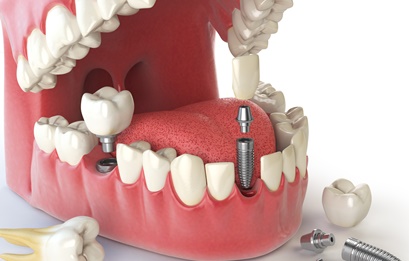
Components of Dental Implants
A dental implants consist of 3 main component parts :
- Implant posts : made from titanium, roxolid (ceramic and titanium) or all ceramic
- Abutment : part that is screwed or retained into the implant posts and holds the prosthese
- Prostheses : crowns, bridge or dentures that is fitted over the dental implant posts that can be made form ceramic or composite material
Titanium and roxolid adapts and assimilates well within the human tissue body. The implant posts is designed to be embeded into the jaw bone of missing tooth to act an as the new teeth roots. Crowns, bridges or dentures are then securely placed over the implant posts with abutments to enable effective chewing function simliar to natural teeth.
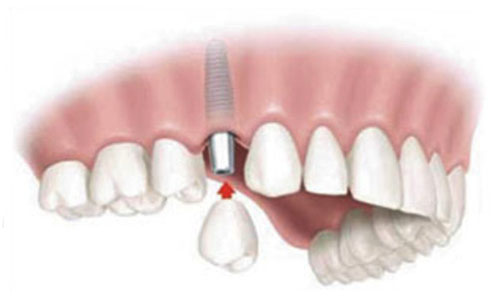
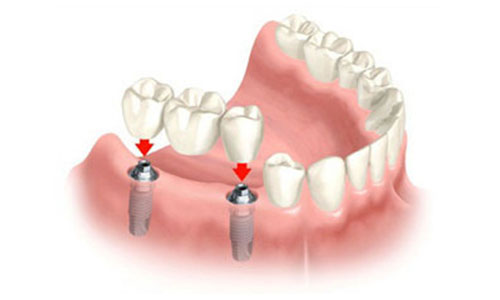
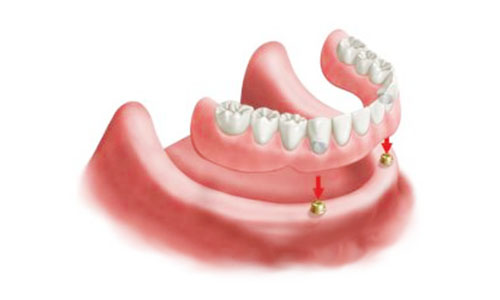
Full Mouth Missing Teeth
Implant dentures, implant full bridges, ProArch (Straumann All-on-4)
Full JawWhat is the duration of the treatment for Chiangmai dental implants?
The total dental implant procedure, in general, may take at least 6-8 months for completion. Timeframe of implant treatment varies with each patient because of different healing capacity. When the implants are successfully surgically placed, the healing process can take up to six months for the implant post and jaw bone to integrate together. After healing, replacement teeth is fitted over the implant post. In certain selective cases with good bone condition, the total implant treatment may only take not more than two months. If the patients has good oral condition and bone, implant prosthesis (crown, bridge or dentures) can almost be instantly fitted during the same period of implant post placement.

Technological developments in dental implant equipment, materials and techniques had made dental implant treatment faster, safer and more comfortable. Digitalized technologies and machines at Chiangmai dental implants clinic include:
- 3D CT digital scan technology that provides for high resolution imaging on the height and weight jaw bone for more accurate diagnoses is used during dental implant treatments. CT scans enable your dentist to view bone density and volume for better diagnoses, treatment planing and potential precautions to take note of during actual treatment. CT Scans increases the patient safety on proper and correct implant surgical placement .
- Computer guided implant surgery is also used for our dental implant treatment. Computer software programme combines oral scans and images to help determine the position and direction of dental implants placements. The software highlights any margins of errors, helps your dentist to pre-plan dental implants placement.
- Digital surgical templates guides increases accuracy of implant placements and in certain cases enables flapless surgical procedures for faster healing and less invasive treatments.
- Active surface implants are dental implants that has a special chemical surface coating over its implant posts to encourage and for faster osseointegration between the implant posts and jaw bone. At Chiangmai dental implants center, we use Straumann SLActive implants for active implants that are special ranges of implant systems for increased success rates.
- Digitalized dental lab at chiangmai dental implants clinic provide for customized abutments and zirconia crowns and bridges over implants. CAD/ CAM digital milling machines are used to mill the abutments enables individualized angulations of occlusion bite
Immediate load implants are done when temporary or permanent prostheses (crowns, bridge or dentures) are loaded over dental implant posts during the same trip when the implant posts are surgically embedded. Immediate load or immediate function implants
- reduces wait time for final prostheses
- teeth is replaced immediately during the same trip for better aesthetics and confidence
Immediate load implant is done only for selected cases that has no contra-indications. Temporary crowns, bridge or dentures will need to be changed and adjusted at a later stage for long term results.
Immediate placement implants or same day implants are done whereby an implant posts is embedded during the same surgical visit when the natural tooth is extracted. Immediate placement implants :
- reduces wait time for treatment as there is no need to wait for normal wound healing.
- There are less procedure steps and potential pain whereby patient undergo teeth removal and implant post placement within one visit
- helps reduce bone solubility as the dental implant posts replaces natural tooth root immediately
- Reduces the chance of gum recession
Immediate placement implants is done only for selected cases. It is done for cases whereby the final dental implant positioning matches the original natural tooth positioning. There must not be any infection in the area for immediate placement implants. There must also be sufficient amounts of bone in the area for the dental implant to be held post teeth removal.
Conventional implants are the standard procedure used for the majority of dental implant treatments. The process starts with the removal of the original natural tooth. The gums and bone is left to heal for around 2 months or more. After healing, the dental implant posts is embedded to act as the new tooth roots. After implanting the post, the implant is left heal to allow the implant posts and jaw bone to become fully attached for about 3 to 6 months depending on the nature of the bone. The dentist then continues to build the prostheses (crown, bridge or dentures) over the implant posts.
How are Dental Implants Treatment done ?
- Your dentist will conduct oral examinations that normally include panoramic x-ray imaging, CT scans, and possible dental study models for diagnosis
- Your implantolgoist then plans and discusses the treatment plan and options with you. Decisions on dental implant treatment include the expected final prostheses and correct implant positions suited to you
- On confirmation of dental implant treatment, the 1st stage implant post placement surgery is done. The implant post is embedded into jaw bone. A healing cap or temporary prostheses may be placed over the implant posts whilst waiting for the implant post to integrate with the jaw bone. Generally, it will take about 3-6 months
- When the implant is firmly fixed, your dentist builds the prosthese (crowns, bridge or dentures) over the implant posts
After dental implant is completed, regular dental checkups of every 6 months to 1 year is recommended at CIDC chiangmai dental implants center to clean or ensure that your dental implants are integrated well.
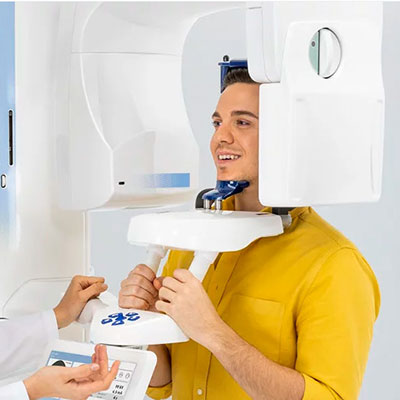
Panoramic X-ray & CT Scan
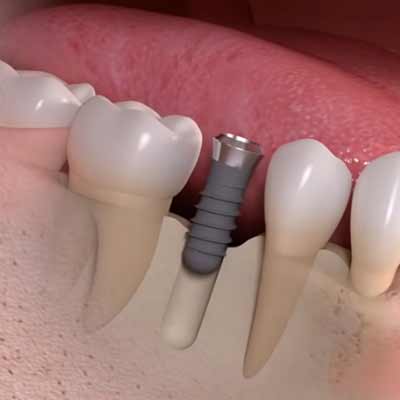
1st stage implant post placement
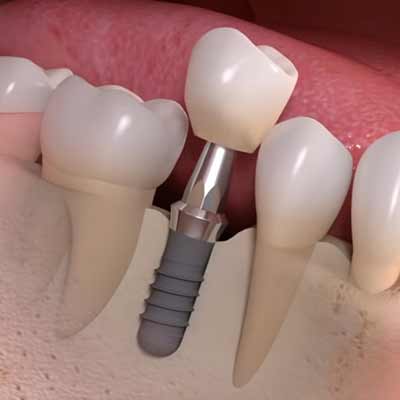
2nd stage prosthese over implant
What to expect in your visit for dental implant ?
During your first visit at our chiangmai dental implants clinic, your dentist will perform a through evaluation of your case along with the examination of your teeth and mouth. A comprehensive dental exam is often prescribed in order to get a complete diagnosis of your dentalhealth.Models of your teeth and mouth structure are often created and dental x-ray taken , so that your dentist can design the proper treatment plan
If you have a proper bone structure and healthy gum tissue for the implant to stay , then you can get dental implants. But if you have problem from malfunction teeth such as clenching or systemic disease like diabetes, just like any other surgical procedure, your medical history can play in whether or not you can undergo dental implantation.It is always advisable to have a consultation with your dentist before going for dental implants as success rate might lesser in such cases . Similarly , people who smoke or drink alcohol may not be good for dental implants too.
How your dental implant surgery will go down largely depend on the type of implant that you choose ,as well as the condition of your teeth and your jaw bone.The surgery typically involves several procedures including bone grafting ( when needed ), removal of the damaged tooth , the actual implantation , and the restoration with the crown.
Dental implantation is a highly tailored procedure designed based on the unique case of thepatient . Your treatment plan willtake into accountdifferent factors that will affect the treatment ,like the number of teeth you may need replaced ,as well as the condition and health of your jawbone.
Contra-indications to Dental Implants Treatment
There are some scenarios whereby dental implant treatments may be guarded or unsuitable :

- individuals with insufficient jaw bones in the area to hold the dental implant posts may need bone grafting whereby the dentist will need to re-evaluate after bone graft procedure if you are a candidate for dental implants
- individuals with severe or related medical health reasons (such as osteoporosis or undergoing cancer treatment), have certain congenital diseases that may cause oral and jawbone conditions may not be suitable for dental implant treatments
- People who smoke heavily and does not give up smoking carries a much higher risk of dental implant treatment failure
- Those who are still in their growth stage should wait for completed growth of the face and jaw prior to seeking of dental implant treatment
- A dental implant is a biocompatible titanium core which can bond within the jaw bone. Each implant acts as a root for supporting a crown or denture.
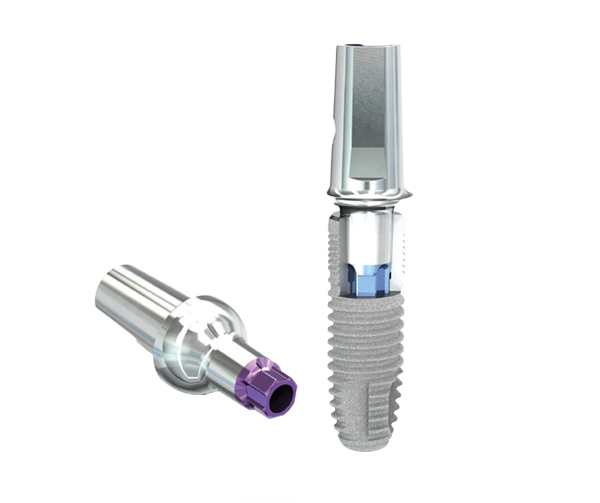
- Losing teeth will affect your smile and bite. Moreover, the jaw bone will continue to shrink which can lead to change lip, cheek and facial apparent overtime. Thus, replacing the missing teeth is recommended.
- The candidates are mostly adults, because of the matured jaw bone. Some medical problems are contraindicated such as patients receiving antiresorptive medication or radiotherapy around head and neck, so you may need to contact your clinician first.
- Dental implants are placed under local anesthesia, so there should be limited pain during the treatment. You will be provided with medications to alleviate minor discomfort.

- A bone or gum tissue graft may de needed in some cases, which is evaluated from oral examination and CBCT.
- The procedure usually takes about an hour. However, it depends on quantity and the location of implants placed.
- Soft diet is recommended and hard foods should be avoided at the surgical site until healing is completed (3-6 months).
- Generally, it takes 3-4 months after implant placement. However, an additional 2-6 months is required in cases with bone or gum tissue grafts.
- Successfully intregrated implants will last many years if they are given proper care. A study shows high survival rate of dental implants (97.27%).
References
- Papaspyridakos P, Chen CJ, Singh M, Weber HP, Gallucci. Success criteria in implant dentistry: a systematic review. J Dent Res. 2010; 91 : 242-8.
- Kritsada W, Montri C. Peter R, Pathawee K. Clinical results of implant treatment in a center of excellence for implantology clinic: a retrospective clinical study. CM Dent J 2017:38 :121-30.
- Pat V, Nikos M, Pagaporn P, Atiphan P,Keskanya S. Post-treatment patient-reported outcome measures in a group of Thai dental implant patients. Cli Oral Impl Res. 2019: 00: 1-12.

